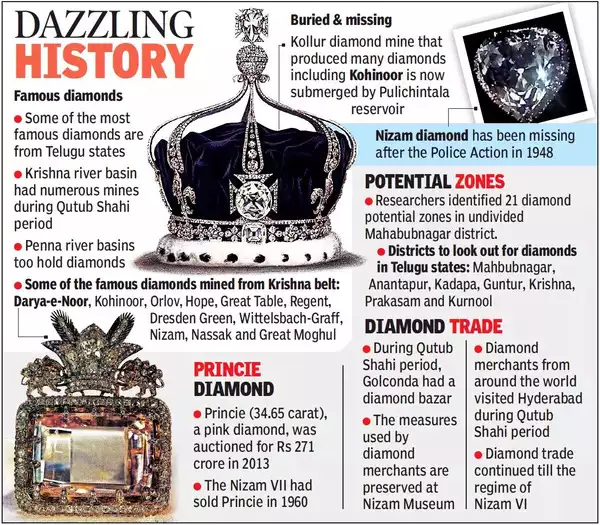Andhra Pradesh: India’s Kohinoor, Home to the Famed Diamond
Why in the news?
Andhra Pradesh is highlighted for its historical link to the legendary Koh-i-Noor diamond, reflecting its cultural richness, historical significance, and contributions to India’s heritage.
Origin of the Koh-i-Noor Diamond:
- Andhra Pradesh is often called the “Kohinoor of India” due to its association with the famous Koh-i-Noor diamond.
- The diamond is believed to have been mined from the Kollur Mine in the Guntur District during the reign of the Kakatiya dynasty.
- The term “Koh-i-Noor,” meaning “Mountain of Light” in Persian, highlights the diamond’s brilliance and immense historical value.
Historical Journey Across Empires:
- The Koh-i-Noor diamond has travelled through various empires, symbolising power and prestige across India and Britain.
- Its allure attracted rulers from multiple regions, marking it as a prized possession with a complex history.
- The diamond’s legacy contributes to Andhra Pradesh’s identity, representing the region’s historical importance in the global diamond trade.
Andhra Pradesh: A Cultural Gem
- Beyond diamonds, Andhra Pradesh is celebrated for its vibrant culture, historical monuments, and contributions to India’s heritage.
- Known for its diverse traditions, the state is a blend of rich cultural practices and historic architecture.
- Andhra Pradesh remains a valuable part of India, reflecting both its historic wealth and contemporary cultural significance, earning its title as the “Kohinoor of India.”
About Koh-i-Noor diamond:
- The Koh-i-Noor diamond, meaning “Mountain of Light” in Persian, is among the world’s largest and most famous cut diamonds.
- Originally weighing 191 carats, it was recut to 6 carats in 1852 by Garrard of London for enhanced brilliance.
- Its earliest mention dates back 5,000 years in a Sanskrit text as “Syamantaka.”
- The diamond passed through various rulers, including Allaudin Khilji, Babur, Shah Jahan, and Nadir Shah, who named it.
- In 1849, it was seized by the British and became part of the British crown jewels.
Sources Referred:
PIB, The Hindu, Indian Express, Hindustan Times




